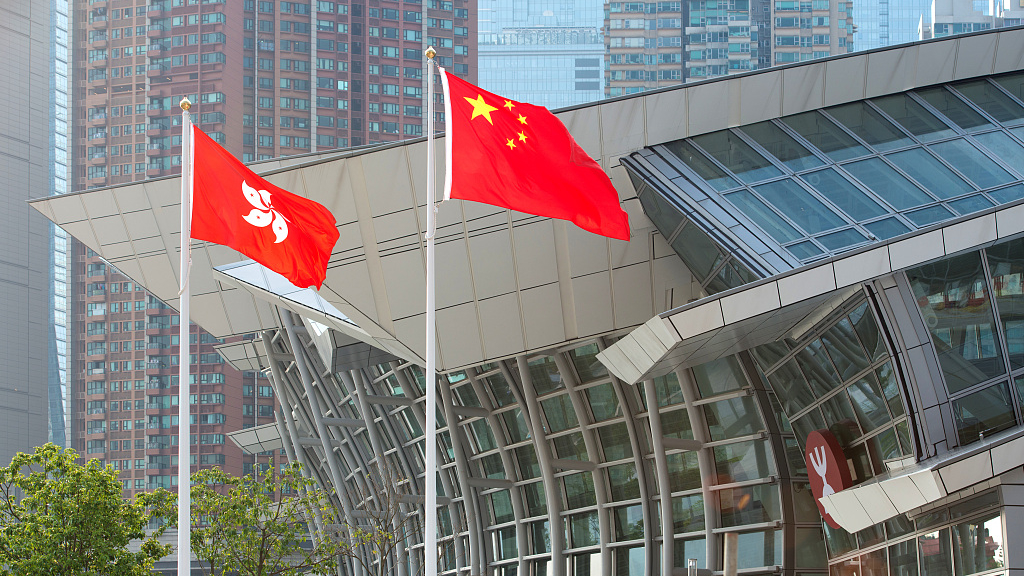
(Photo: CGTN)
The Hong Kong Special Administrative Region (SAR), "Asia's World City," is the focus of global attention once again. On Sunday, protesters marched to the Liaison Office of the Central People's Government after an anti-extradition bill demonstration at around 4.30 p.m. and "maliciously" surrounded and tried to storm the office. Some people even damaged the Chinese national emblem and painted insulting words on the walls outside the office. The day before this chaos, 300,000 people gathered in the city's Tamar Park to hold a pro-government meeting and call for an end to recent violence.
Western media's misleading can’t dampen Hong Kong’s mainstream public opinion
Some Western media outlets, despite the notion that objectivity is the hallmark of good journalistic practice, have failed to report on the Hong Kong issue in an objective and fair manner for a long time. Instead they are endeavoring to blur right and wrong and intensify contradictions between the HKSAR government and its residents.
In one video, a BBC reporter followed Saturday’s rally in Hong Kong and did a livestream, claiming that the gathering was much weaker compared with the anti-fugitive offender's bill demonstrations because there were only thousands of people there, which is less influential than the protesters’ demonstration.
However, the fact is that hundreds of thousands of people attended this rally. The majority of Hong Kong people are going for the government’s proposal to pass the fugitive offender's bill, and they are against the violence as well.
The BBC’s coverage caused an outcry among some in the group, who called it “fake news.” In fact, the majority of Hong Kong people are not indifferent to the current protests. Instead, most residents have voiced concerns about the recent riots breaking out during protests over the suspended fugitive offender's bill, and have denounced the violent acts.
All walks of life condemn violent acts
A spokesperson for the Hong Kong and Macao Affairs Office of the State Council has strongly condemned the violent acts perpetrated at the Liaison Office of the Central People's Government in the Hong Kong Special Administrative Region (HKSAR).
Defacing the Chinese national emblem is far beyond peaceful protesting. These "protesters" not only violated the Basic Law of HKSAR, the political bedrock of Hong Kong but also challenged the bottom line of the “One Country, Two Systems.”
The violent and illegal behavior has provoked resentment among all walks of life in Hong Kong.
"This has posed threats to HKSAR's public security and 'One Country, Two Systems' principle and the Hong Kong society shall not accept it," a spokesperson for the HKSAR government said in a statement on Sunday.
Ordinary residents are also eager to stop the riots as soon as possible. Rule of law is the basic building block of Hong Kong’s prosperity. The public has recognized that it is only through creating a financially-beneficial environment that Hong Kong’s success and international status could be ensured. The violence has had damaging impacts on the local economy that could have long-term effects on people’s daily life.
“I hope the riot will be put down soon and Hong Kong will put on the right track,” said Mr. Zhang, a manager of a pharmacy in Tsim Sha Tsui. His remarks are the embodiment of Hong Kong’s mainstream values on the riot. Most local people are strongly against the violence.
“One country” is the premise of “two systems”
This July 1 marked the 22nd anniversary of Hong Kong’s return to China. The past two decades have witnessed rapid development in HKSAR regarding economy, culture and politics. All the achievements should be owed to Hong Kong’s unique system – “One Country, Two Systems,” which enables Hong Kong to reap the benefits of the rising of China.
Although "One Country, Two Systems” plays a crucial role in the HKSAR’s development, it doesn’t necessarily mean one part is superior to the other. In fact, “one country” is the premise of “two systems” and the guarantees of the SAR’s thriving economy. Hong Kong’s enviable prosperity after 1997 is the representation of the benefits of being a part of China.
However, due to anglophile sentiment, a small number of Hong Kong people have challenged the “one country.” The series of protests and damaging the Chinese national emblem showed their true colors to the world: their main purpose is not merely withdrawing the extradition bill, now suspended by the HKSAR government. Rather, their ultimate goal is collapsing the HKSAR government through emphasizing the importance of “two systems,” and in dismissing “one country” as unimportant and even trying to hold back China’s development.
Their scheme is doomed to failure because most residents have realized that "one country" is the premise of "the two systems" and it is only through “one country” that the “two systems” are able to unlock the HKSAR's potential.


